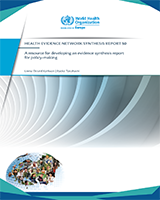NCBI Bookshelf. A service of the National Library of Medicine, National Institutes of Health.
Karlsson LE, Takahashi R. A Resource for Developing an Evidence Synthesis Report for Policy-Making [Internet]. Copenhagen: WHO Regional Office for Europe; 2017. (Health Evidence Network Synthesis Report, No. 50.)

A Resource for Developing an Evidence Synthesis Report for Policy-Making [Internet].
Show details3.1. Composition of the review team
The composition of the review team should optimally include subject experts, methodologists (e.g. for particular types of review), a librarian/information specialist and someone familiar with knowledge translation and policy formulation. The review team or the authors should:
- demonstrate methodological expertise and experience in conducting systematic and transparent evidence syntheses;
- have a track record of research and publication on a relevant subject area (e.g. visibility in MEDLINE or another relevant databases);
- have experience in knowledge translation and knowledge brokering;
- have adequate and relevant resources and support to perform an evidence synthesis, considering the scope of the review and the timeline; and
- declare any potential conflict of interest in delivering fair and balanced evidence and policy options.
3.2. Conflict of interest
The review team is tasked with conducting a systematic and transparent evidence synthesis of high integrity in which decision-makers can place confidence. The review team members are required to declare any conflict of interest with the subject areas of the synthesis before they embark on the synthesis process. WHO defines a conflict of interest as “any interest declared by an expert that may affect or reasonably be perceived to affect the expert's objectivity and independence in providing advice”. WHO staff can give guidance on any potential conflict of interest.
When a review team is selected, the commissioner performs due diligence and risk assessment to preserve the integrity, reputation and independence of the work. All review team members should declare and document any potential or actual conflicts relevant to tasks assigned.
- 3. SKILLS, CAPACITY AND RESOURCES REQUIRED TO UNDERTAKE A SYNTHESIS - A Resource...3. SKILLS, CAPACITY AND RESOURCES REQUIRED TO UNDERTAKE A SYNTHESIS - A Resource for Developing an Evidence Synthesis Report for Policy-Making
Your browsing activity is empty.
Activity recording is turned off.
See more...